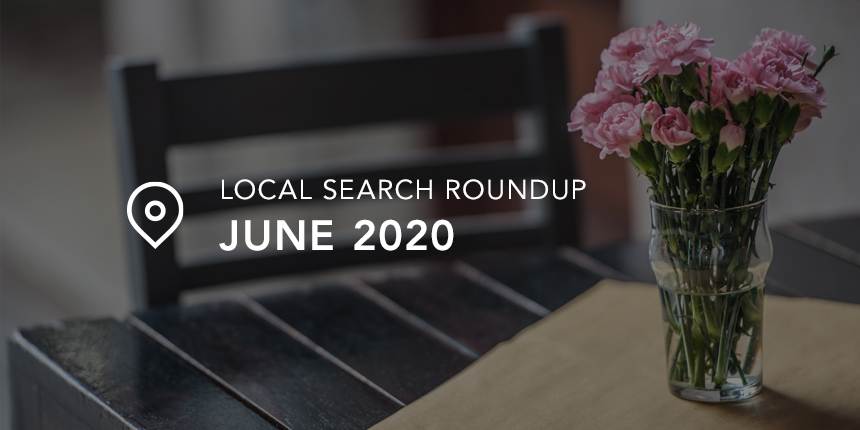COVID-19 has demanded a number of updates to the local listings ecosystem, primarily to better communicate health and safety protocols with customers. Many of these changes, however, appear to be general improvements that have been precipitated by the pandemic but offer value that reaches far beyond crisis response. Expect these features to become mainstays even after the impact of COVID-19 diminishes.
Google My Business (GMB) introduces secondary business hours
Google released a new GMB feature to let users set “more hours”. These additional hours are intended for non-standard operating hours, such as grocery stores offering seniors-only shopping times. This is a clear response to the pandemic as many businesses have been compelled to offer modified schedules to accommodate health and safety restrictions. There are, however, many standard business practices that can greatly benefit from this update, including businesses that have appointment-only hours, drive-through hours, or other such non-standard but common operating times.
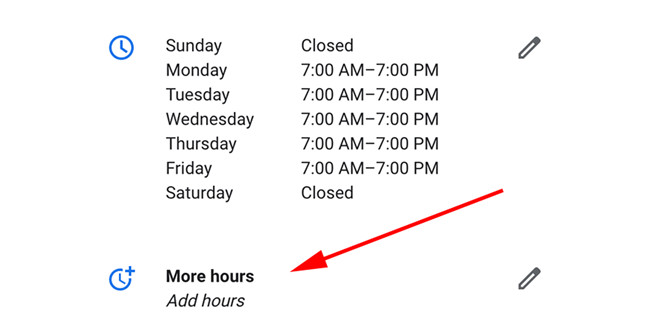
When choosing this “more hours” option, users will be able to select a category to specify their purpose, including happy hour, brunch, pickup, and more. There is also plenty of flexibility: you can set hours by specific days, and even multiple times per day. For example, a restaurant with large gaps in hours between breakfast, lunch, and dinner can specify exactly when it is open and for what purpose.
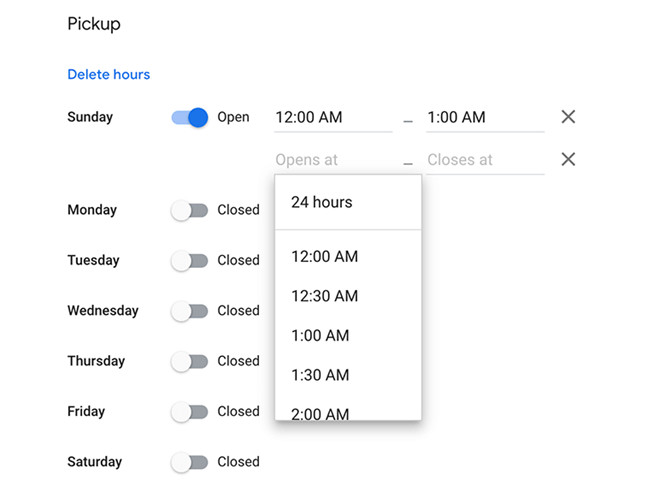
This is an amazing new feature for GMB even without its COVID-specific applications. Many businesses have operating hours that don’t necessarily apply to the public but still need to be listed. This update removes the need for businesses to list their full breadth of hours, which often causes conflicts between what is listed on GMB and the business’s own, more robust store locator. With this issue solved, all businesses should take advantage.
Google adds and edits attributes in multiple categories
Attributes have always been a feature in GMB, but have recently been in the spotlight because of the pandemic. In the restaurant industry, customers needed to know which restaurants offered dine-in, takeout, and/or delivery. As a result, attributes became a vital feature for restaurants and quickly became vital for retailers as well when Google introduced the “curbside pickup” attribute. Now Google has expanded its attributes with a longer list of attributes available across all relevant business categories.
Businesses now have the optional attributes of:
- curbside pickup
- no-contact delivery
- dine-in
- online classes
- online appointments
- online estimates
Hotels have also seen their own specific upgrades to attributes. Prior to COVID-19, attributes and amenities were a requisite in the hospitality industry. Hotels can now specify with their attributes:
- the ability to add the amount of restaurants on site
- a selection of payment and inclusive rate options
- a large selection of languages that staff can accommodate
- housekeeping and the ability to select services therein
- parking options plus charges
The attribution rabbit hole goes much deeper than these updates. As they become a new standard feature of GMB, businesses are finding new strategies to utilise them both to work around COVID-19 and as a general business strategy. If your businesses are not taking advantage of this new prominent feature, you should take care to include it in your business strategy before your competition does.
Google rolls out a new 3-pack carousel
Google has launched a new 3-pack carousel display with a strong focus on images. The new carousel update includes five images from businesses, with the first displayed being the one deemed to be most relevant for the user’s specific query. This means that the first image users sees on the carousel will not necessarily be the business’s logo or whatever the business owner has set as their primary profile image.
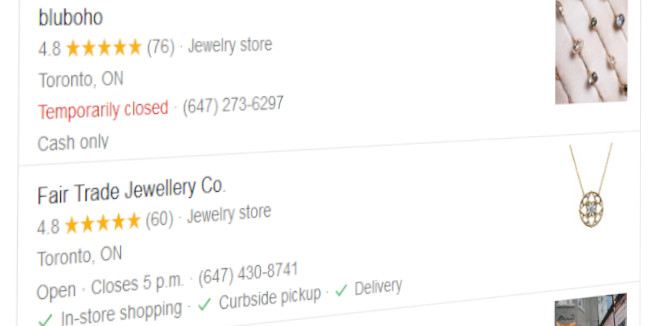
Google launched another image-based update earlier this year that adjusted which images of a business were shown based on the user query. For example, if a user searched for “gold bracelets”, they would be shown images from local jewelers, but a search for “ruby earrings” would generate different image results. Businesses that have relevant images attached to their GMB profiles will be rewarded with higher rankings on some queries, and this new update is more proof of that. Make sure your imagery covers as many aspects of your business as possible.
Google adds preferred ordering options and verifies virtual kitchens
Restaurants can now specify their preferred ordering method on GMB. With many restaurants resisting third-party ordering apps, the ability to have orders default to their first-party delivery option is a major boon. Other options will still be available to users who wish to use their app of choice.
Google is also now allowing virtual kitchens to be listed on GMB. For those unfamiliar virtual kitchens (or “cloud kitchens”, as they are sometimes known), they are cooking spaces made available to restaurants that offer delivery but have no dine-in option. The purpose is to allow more delivery-based food options to consumers without the additional burden to restaurants of having to rent out costly, high foot traffic venues. The ability to choose ordering methods will be especially beneficial to these businesses given that delivery is generally 100% of their revenue stream.
Local store details added to Shopping tab
The importance of accurate GMB information has been emphasised again by it becoming a relevant factor in Google’s other products. Google’s Shopping tab is now showing the product availability, locations, and options (such as curbside pickup) through information pulled from GMB. Merchants who sell their items via the Google Product Feed now have cross integration which shows where users can buy the product online and in local stores that carry it. Users who click these products will be able to click to call, get directions, or be linked to a product catalogue hosting similar items.
With GMB profiles now being shown to immediate shoppers and not just those looking for business information for other reasons, it makes it even more valuable to ensure accurate GMB information. High-value customers who are immediately looking to make a purchase are going to view local listings, and losing this type of customer’s business due to poor GMB management would be a missed opportunity. These local store details also emphasise the importance of assigning attributes to your listing such as curbside pickup or delivery. It is imperative that retailers fully fill in their content on GMB. In order to remain competitive, setting up a proper local products feed will also be a requirement to be included in these searches.
Yelp offers upgraded COVID-19 reopening tools for local businesses
As Yelp’s primary market is local restaurants, they were required to have some form of COVID-19 response to help their clients. Initially, a banner was made available so that users could be directed to each individual business’s pandemic response page, but now additional tools have been made available. A much larger canvas on restaurant listings gives room for businesses to provide communication changes, updates, and other important health and safety information. This feature will also indicate when the most recent COVID-19 updates were added to ensure customers have the most accurate information.
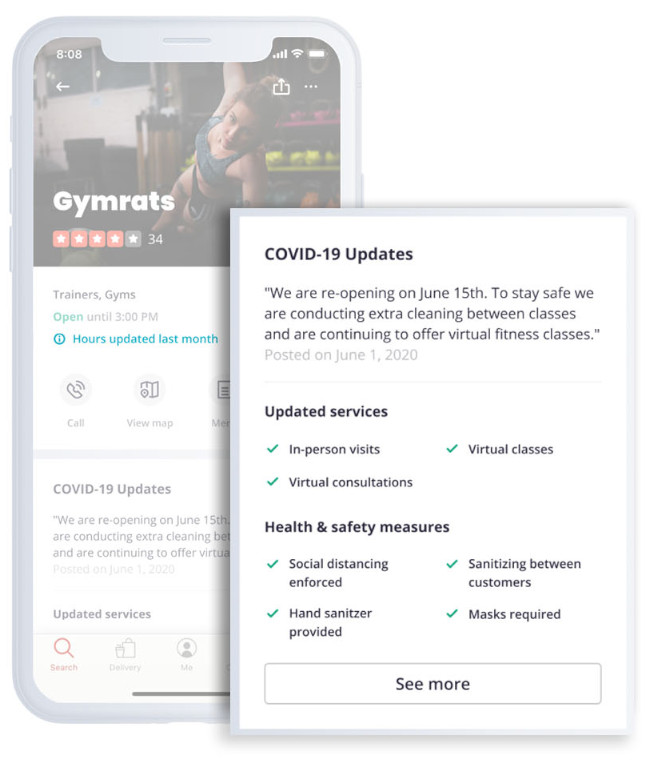
Yelp, like Google, is also allowing businesses to attach additional attributes to their listings. Information such as contactless payment and mask requirements will be front and centre for potential diners. Other relevant information being highlighted includes new capacity limitations. Yelp has added the ability to establish maximum seating capacities, which will alert staff when a restaurant reaches 90% of its capacity. Manual controls are in place for staff to adjust expected wait times and make other alterations while they adhere to social distancing guidelines.
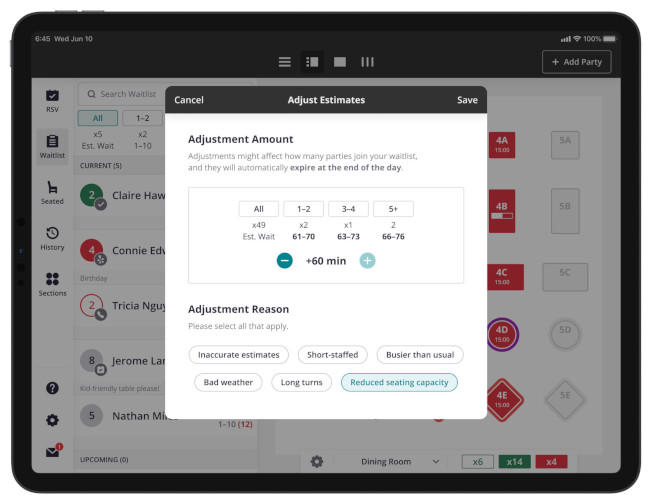
Facebook Messenger can now be used to answer customer messages
For an ease of use update, Facebook Messenger now allows businesses to respond to messages sent by customers. Instead of social media managers having to toggle back and forth between separate applications, the same app can be utilised for both personal messaging and customer messaging. Business owners will be able to choose whether they are responding back as the business or themselves.
This integration of business functionality into the standard messaging app is not intended as a replacement for the already existing Page Manager. It is only an upgrade to Facebook Messenger for communication purposes. Functionality such as creating adds and viewing insights still dedicated to the Page Manager.
Want to get ahead of the game in local listings? The benefits are many and varied—and we know exactly how to bring them about. Let’s talk.
